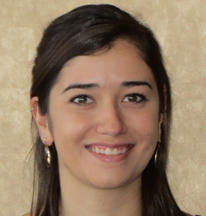
Nicole Zarate
Thesis Title:
Mechanisms and consequences of HSF1 degradation in Huntington's disease
Current Position:
Postdoctoral Researcher
University of Minnesota
Undergraduate Institution and Major:
University of Texas, B.S. in Neuroscience, 2017
Graduate Advisor:
Rocio Gomez-Pastor, Ph.D., Department of Neuroscience
Description of Graduate Research:
My research is focused on the role of Heat Shock Factor 1 (HSF1) in the context of Huntington's disease (HD). I am particularly interested in uncovering mechanisms for neuronal dysfunction and synapse loss in HD and how HSF1 could be mediating this hallmark of the disease.
Graduate Publications:
- Striatal spatial heterogeneity, clustering, and white matter association of GFAP+ astrocytes in a mouse model of Huntington's disease. Front Cell Neurosci. 2023 Apr 28;17:1094503.
- Tumor suppressor p53 regulates heat shock factor 1 protein degradation in Huntington's diseaseCell Rep. 2023 Mar 2;42(3):112198.
- Zarate N, Gundry K, Yu D, Casby J, Eberly LE, Öz G, Gomez-Pastor R. Neurochemical correlates of synapse density in a Huntington's disease mouse model. J Neurochem. 2023 Jan;164(2):226-241.
- CK2 alpha prime and alpha-synuclein pathogenic functional interaction mediates synaptic dysregulation in huntington's disease. Acta Neuropathol Commun. 2022 Jun 3;10(1):83.
- Zarate N, Intihar TA, Yu D, Sawyer J, Tsai W, Syed M, Carlson L, Gomez-Pastor R. Heat shock factor 1 directly regulates postsynaptic scaffolding PSD-95 in aging and Huntington's disease and influences striatal synaptic density. Int J Mol Sci. 2021 Dec 4;22(23):13113.
- Zarate N, Gomez-Pastor R. Excitatory synapse impairment and mitochondrial dysfunction in Huntington's disease: heat shock factor 1 (HSF1) converging mechanisms. Neural Regen Res. 2020 Jan;15(1):69-70.
Oral Presentations
- Zarate N, Yu B, Larson S, Gundry K, Moreno D, Oz G, Thiele D. Gomez-Pastor R. HSF1 transcription factor regulates excitatory synapse dysfunction in Huntington’s Disease by modulating the expression of the post-synaptic protein PSD-95. Oral presentation at the Maurice B. Visscher Symposium Young Investigators’ Competition. Minneapolis, MN, 2019.
- Zarate N, Larson S, Oz G, Thiele D, Gomez-Pastor R. The transcription factor HSF1: a new regulator of excitatory synapses in Huntington’s Disease. Oral presentation at the Midwest Stress Response and Molecular Chaperone Meeting. Evanston, IL, 2019.
Graduate Abstracts
- Zarate N, Larson S, Oz G, Thiele D, Gomez-Pastor R. The transcription factor HSF1: a new regulator of excitatory synapses in Huntington’s Disease. Poster presentation at the CAG Triplet Repeat Disorders Gordon Research Conference. Il Ciocco, Italy, 2019.
Graduate Awards:
- 1st place graduate student presentation at the Maurice B. Visscher Symposium Young Investigators' Competition 2019
- 1st place poster presentation at Wallin Neuroscience Discovery Day 2019
- Dean's Distinguished Graduate Fellowship, 2017-2018
Graduate Program in Neuroscience Committee:
- Student Board (elected) 2017-2019
University of Minnesota Committees
- Council of Graduate Students (COGS) representative 2019-2020
Research Categories
- Neurodegenerative Diseases and Neural Injury
Rotations
- Michael Lee, Ph.D., Department of Neuroscience
- Marija Cvetanovic, Ph.D., Department of Neuroscience
- Rocio Gomez-Pastor, Ph.D., Department of Neuroscience
Undergraduate Awards
- Undergraduate Research Fellowship, 2016
Undergraduate or Post-Bac Research
My work as an undergraduate focused on the genetic mechanisms of behavior and how they contributed to neurological disorders. The main project I worked on used C. elegans to characterize a novel regulatory apoptotic pathway.
What Got You Interested In Research?
I was required to take a research methods course during my freshman year as an undergraduate. Most of the students in the class were only there to get the credit and leave. However, I found myself enthralled by everything research had to offer. My instructor for the course was an incredible mentor and encouraged me to delve deeper into research during my time as an undergraduate. The lab I worked in for the rest of college not only increased my passion for neuroscience but established my desire to make an impact in the scientific community.
Why Did You Choose MN?
I was initially drawn by the neurodegenerative disease research. However, the highly collaborative spirit between faculty, cohesiveness of current students, and Itasca were the key selling points!
Student Mentor and the Best Advice They Gave:
Austin Ferro: Email/talk to people who have rotated in labs you’re interested in, as they can offer the best insights. Also that Itasca is a time to relax and bond with your classmates.
Favorite Itasca Memory:
Without a doubt karaoke night at Lobo’s is my favorite memory. We danced, sang our hearts out, teamed up with a bachelorette party, and got everyone in the bar to join a conga line. The cherry on top, though, was Armani serenading us with Britney Spears.
